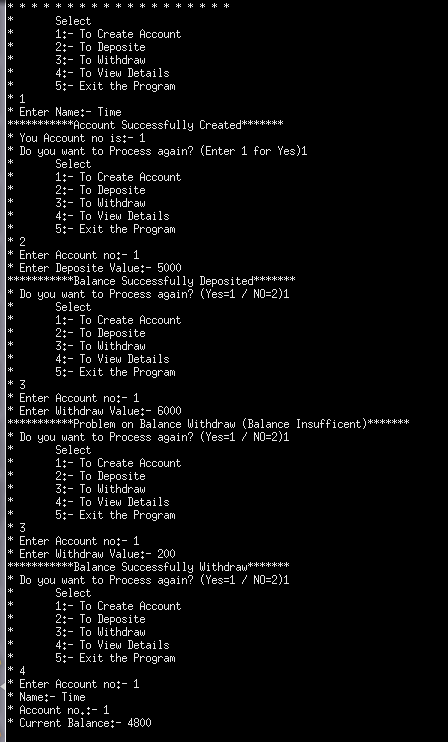Hello there, Here is a python code to convert what ever number you enter into words. First it will take a input. It wont ask with any message. Then it give back the number in words form. Here is no any code to handle unexpected user input. This program works for once to Hundred Billion.
Sample input:-
104382426112
Expected Output:-
One Hundred Four Billion Three Hundred Eighty Two Million Four Hundred Twenty Six Thousand One Hundred Twelve
If you found it useful or if you are in need of it you can use it for any purpose. You can it extend to use for Trillion and so on.....
Sample input:-
104382426112
Expected Output:-
One Hundred Four Billion Three Hundred Eighty Two Million Four Hundred Twenty Six Thousand One Hundred Twelve
1 2 3 4 5 6 7 8 9 10 11 12 13 14 15 16 17 18 19 20 21 22 23 24 25 26 27 28 29 30 31 32 33 34 35 36 37 38 39 40 41 42 43 44 45 46 47 48 49 50 51 52 53 54 55 56 57 58 59 60 61 62 63 64 65 66 67 68 69 70 71 72 73 74 75 76 77 78 79 80 81 82 83 84 85 86 87 88 89 90 91 92 93 94 95 96 97 98 99 100 101 102 103 104 105 106 107 108 109 110 111 112 113 114 115 116 117 118 119 120 121 122 123 124 125 | one = ['', 'One', 'Two', 'Three', 'Four', 'Five', 'Six', 'Seven', 'Eight', 'Nine']
tenp = ['Ten', 'Eleven', 'Twelve', 'Thirteen', 'Fourteen', 'Fifteen', 'Sixteen', 'Seventeen', 'Eighteen', 'Nineteen']
tenp2 = ['', '', 'Twenty', 'Thirty', 'Forty', 'Fifty', 'Sixty', 'Seventy', 'Eighty', 'Ninety']
def once(num):
word = ''
word = one[int(num)]
word = word.strip()
return word
def ten(num):
word = ''
if num[0] == '1':
word = tenp[int(num[1])]
else:
text = once(num[1])
word = tenp2[int(num[0])]
word = word + " " + text
word = word.strip()
return word
def hundred(num):
word = ''
text = ten(num[1:])
word = one[int(num[0])]
if num[0] != '0':
word = word + " Hundred "
word = word + text
word = word.strip()
return word
def thousand(num):
word = ''
pref = ''
text = ''
length = len(num)
if length == 6:
text = hundred(num[3:])
pref = hundred(num[:3])
if length == 5:
text = hundred(num[2:])
pref = ten(num[:2])
if length == 4:
text = hundred(num[1:])
word = one[int(num[0])]
if num[0] != '0' or num[1] != '0' or num[2] != '0':
word = word + " Thousand "
word = word + text
if length == 6 or length == 5:
word = pref + word
word = word.strip()
return word
def million(num):
word = ''
pref = ''
text = ''
length = len(num)
if length == 9:
text = thousand(num[3:])
pref = hundred(num[:3])
if length == 8:
text = thousand(num[2:])
pref = ten(num[:2])
if length == 7:
text = thousand(num[1:])
word = one[int(num[0])]
if num[0] != '0' or num[1] != '0' or num[2] != '0' :
word = word + " Million "
word = word + text
if length == 9 or length == 8:
word = pref + word
word = word.strip()
return word
def billion(num):
word = ''
pref = ''
text = ''
length = len(num)
if length == 12:
text = million(num[3:])
pref = hundred(num[:3])
if length == 11:
text = million(num[2:])
pref = ten(num[:2])
if length == 10:
text = million(num[1:])
word = one[int(num[0])]
if num[0] != '0':
word = word + " Billion "
word = word + text
if length == 12 or length == 11:
word = pref + word
word = word.strip()
return word
# 104382426112 One Hundred Four Billion Three Hundred Eighty Two Million Four Hundred Twenty Six Thousand One HUndred Twelve
test = int(input())
a = str(test)
leng = len(a)
if leng == 1:
if a == '0':
num = 'Zero'
else:
num = once(a)
if leng == 2:
num = ten(a)
if leng == 3:
num = hundred(a)
if leng > 3 and leng < 7:
num = thousand(a)
if leng > 6 and leng < 10:
num = million(a)
if leng > 9 and leng < 13:
num = billion(a)
print(num)
|
If you found it useful or if you are in need of it you can use it for any purpose. You can it extend to use for Trillion and so on.....
